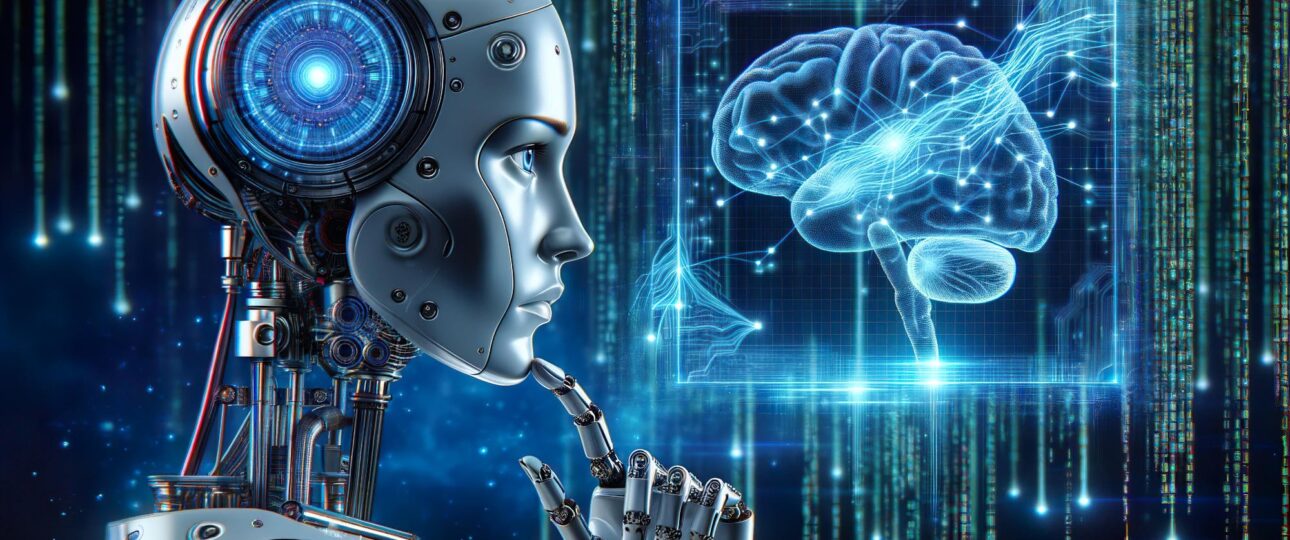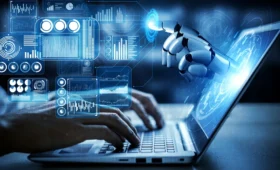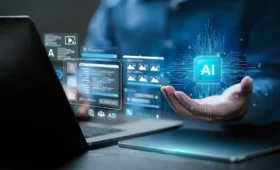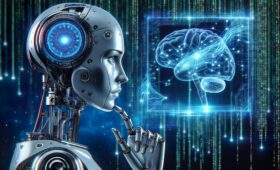Artificial Intelligence (AI) is no longer just a concept from science fiction—it has become an integral part of modern technology, influencing everything from healthcare to entertainment. As AI continues to evolve, it’s transforming industries, creating new possibilities, and raising important questions about the future. In this article, we’ll explore the impact of AI, its applications, and what it means for the future of work, ethics, and society.
1. What is Artificial Intelligence?
Artificial Intelligence refers to the simulation of human intelligence in machines that are programmed to think, learn, and make decisions like humans. AI systems use algorithms and vast amounts of data to recognize patterns, solve problems, and make predictions. AI technologies range from simple rule-based systems to more advanced machine learning models and neural networks.
Types of AI
There are three main types of AI:
- Narrow AI (Weak AI): This type of AI is designed to perform a specific task, such as facial recognition or language translation. Most AI applications today fall into this category.
- General AI (Strong AI): General AI is a more advanced form of AI that can perform any intellectual task that a human being can do. It remains largely theoretical and has not yet been achieved.
- Superintelligent AI: This type of AI would surpass human intelligence in all areas, including problem-solving, creativity, and social intelligence. While it is a topic of debate, it is not expected to be developed in the immediate future.
2. Applications of AI
AI is revolutionizing numerous industries, enhancing efficiency, creativity, and decision-making. Here are some key areas where AI is making an impact:
Healthcare
AI is transforming healthcare by improving diagnostics, personalized treatment plans, and drug discovery. Machine learning algorithms can analyze medical data, detect patterns, and predict potential health risks. AI-powered diagnostic tools can assist doctors in diagnosing diseases like cancer, heart conditions, and neurological disorders with greater accuracy and speed.
Finance
AI is widely used in the financial sector for fraud detection, risk assessment, and investment management. AI systems analyze vast amounts of data to identify fraudulent transactions and provide real-time alerts. Additionally, AI-driven algorithms help investors optimize their portfolios and predict market trends, increasing efficiency in trading and decision-making.
Retail
In the retail industry, AI is enhancing customer experiences through personalized recommendations, inventory management, and chatbots. Retailers use AI to analyze consumer behavior, predict demand, and optimize pricing strategies. Chatbots and virtual assistants provide real-time support to customers, improving service efficiency.
Transportation
AI is powering autonomous vehicles, improving traffic management, and enhancing transportation safety. Self-driving cars, trucks, and drones use AI to navigate roads, avoid obstacles, and make real-time decisions. Additionally, AI is helping cities optimize traffic flow, reduce congestion, and minimize accidents.
Entertainment
AI has made significant strides in the entertainment industry, particularly in content creation, recommendation engines, and user personalization. Streaming platforms like Netflix and Spotify use AI to recommend shows, movies, and music based on user preferences. AI is also being used in game development, creating intelligent non-playable characters (NPCs) and enhancing user experiences.
Manufacturing
AI is improving productivity and efficiency in manufacturing by automating tasks, enhancing predictive maintenance, and optimizing supply chains. Robots powered by AI can perform repetitive tasks with precision, while AI-driven analytics can predict equipment failures and help with inventory management.
3. The Future of AI: What Lies Ahead?
AI is advancing rapidly, and its potential is limitless. However, as AI becomes more integrated into daily life, several key issues must be addressed:
Automation and Job Displacement
One of the most significant concerns regarding AI is its potential to replace human jobs. AI and automation can handle tasks that were traditionally performed by humans, especially in industries like manufacturing, logistics, and customer service. While this can lead to increased productivity, it may also result in job displacement, requiring workers to adapt to new roles or industries.
Ethical Considerations
The rise of AI brings forth ethical dilemmas, such as bias in algorithms, privacy concerns, and the potential misuse of AI for harmful purposes. AI systems can inherit biases from the data they are trained on, leading to discriminatory outcomes in areas like hiring, lending, and law enforcement. Ensuring fairness, transparency, and accountability in AI development is crucial to mitigating these risks.
AI and Creativity
AI has shown remarkable abilities in creative fields, such as generating music, art, and literature. As AI becomes more adept at producing original content, the role of human creativity may shift. While some argue that AI can never truly replace human creativity, others believe it can serve as a tool to enhance and inspire new forms of artistic expression.
AI and Personal Privacy
As AI systems become more integrated into everyday life, concerns about personal privacy are growing. AI-powered devices, such as smart speakers, wearables, and surveillance systems, collect vast amounts of personal data. Striking a balance between innovation and privacy protection will be essential to ensuring that AI benefits society without infringing on individual rights.
Regulation and Governance
As AI technology continues to evolve, governments and organizations will need to establish guidelines and regulations to ensure its responsible use. International collaboration will be necessary to create global standards for AI development, addressing issues such as data privacy, safety, and accountability.
4. AI in the Workplace: Collaboration or Competition?
The impact of AI on the workplace is a topic of ongoing debate. While AI has the potential to automate routine tasks, enhance productivity, and assist in decision-making, it also presents challenges for workers and organizations. Companies will need to adapt their workforce by investing in retraining programs and reskilling initiatives to ensure workers can collaborate effectively with AI systems.
AI-Assisted Work
Rather than replacing human workers, AI can serve as a tool to assist in more complex decision-making. For example, AI-powered analytics tools can help professionals in fields such as law, medicine, and finance analyze data and make informed decisions. By automating repetitive tasks, AI allows workers to focus on higher-level problem-solving and creative tasks.
Collaboration Between Humans and AI
In many cases, the future of work will involve humans and AI collaborating. AI can handle data-heavy tasks and provide insights, while humans bring creativity, empathy, and critical thinking to the table. By fostering a collaborative environment, organizations can harness the strengths of both AI and human workers.
5. Challenges and Risks of AI
While AI promises numerous benefits, it also poses risks that need to be addressed:
Security Risks
AI systems, if not properly secured, can be vulnerable to hacking and misuse. AI-powered systems used in critical sectors such as healthcare, finance, and defense could be targets for malicious attacks. Ensuring robust security measures and ethical hacking practices is essential to protect AI systems.
Dependence on AI
As AI becomes more integrated into our daily lives, there is a risk of over-reliance on technology. Relying too heavily on AI systems may diminish our problem-solving abilities and critical thinking skills. It’s important to maintain a balance and ensure that humans remain in control of decision-making.
AI in Warfare
AI-powered weapons and autonomous systems raise concerns about the future of warfare. The use of AI in military applications could lead to ethical issues surrounding accountability, decision-making, and the potential for unintended consequences. International agreements and regulations will be necessary to address these concerns.
Conclusion: The AI Revolution
Artificial Intelligence is one of the most transformative technologies of the 21st century. It’s revolutionizing industries, enhancing our daily lives, and reshaping the future. As AI continues to evolve, it will bring both opportunities and challenges. It’s up to us to ensure that we use this powerful tool responsibly, ethically, and in ways that benefit society as a whole. By understanding AI’s potential and risks, we can work toward a future where humans and machines coexist in harmony.




